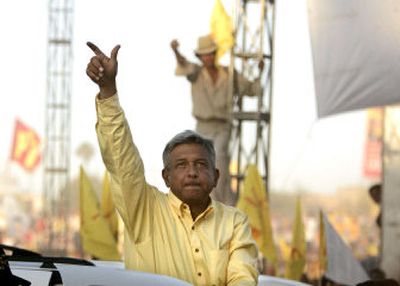U.S. watching Mexico election

MEXICO CITY – When an estimated 40 million Mexican voters go to the polls next month to choose their next president, the result could affect the lives of 296 million people north of the border.
A victory by leftist candidate Andres Manuel Lopez Obrador on July 2 would add an emphatic exclamation point to a series of Latin American elections that has seen voters roundly reject the so-called “Washington consensus,” the model that emphasizes fiscal discipline and the free market.
A victory by conservative candidate Felipe Calderon might make Mexico a stronger U.S. ally than ever before.
“I suspect the Bush administration would prefer Calderon,” said Michael Shifter of the Inter-American Dialogue think tank in Washington, D.C. “There’s a greater likelihood of continuity with Calderon. It would eliminate any concern about making connections to other leaders in South America that they have doubts about.”
Still, analysts in the United States and Mexico note that Lopez Obrador has not made Washington or U.S. business a target of his stump speeches.
“Both Lopez Obrador and Calderon have been very moderate and very mature in the way they’ve handled the topic of the relationship with the U.S. in the campaign,” said Gabriel Guerra Castellanos, a former Mexican diplomat and presidential spokesman. Both candidates have resisted the temptation to play the Yankee-bashing card with voters, he said.
Once trailing badly in the polls, Calderon surged into a virtual tie in March, when he began attacking Lopez Obrador as a dangerous radical, saying his proposals to increase spending on social programs and public works projects would bankrupt the country and bring back hyperinflation.
Last week, a prominent business group in the northern state of Nuevo Leon said it would go on a “tax strike” if Lopez Obrador was elected.
On the campaign trail, Lopez Obrador says he wants to win by a wide margin so the economic elite “doesn’t try to haggle us out of our victory.” Recent polls suggest Lopez Obrador has reclaimed his lead.
With Mexican voters more polarized between rich and poor than at any time since the 1910 revolution, there’s talk that the United States’ most populous neighbor – and the main source of its legal and illegal immigration – could descend into political anarchy and economic crisis in the hours after election night.
“The democracy Mexico has built is fragile,” said Enrique Krauze, a historian and essayist here. “If the result of the election isn’t respected by all parties, there could be chaos. Politics is the fastest theater in the world. Anything could happen.”
For seven decades, the Institutional Revolutionary Party, known as the PRI, ruled Mexico with a firm hand. The party kept together a country with strong regional and class divisions.
The election of Vicente Fox of the conservative National Action Party, or PAN, in 2000 put an end to the “big finger” system by which each president handpicked his successor. But Fox proved to be an ineffective leader. He couldn’t push through the tax reform that was at the heart of his economic plan, and failed to get a new airport built for Mexico City.
Nor has Fox been able to make good on a key promise he made at the beginning of his presidency: that his friendship with a like-minded President Bush would quickly bring a comprehensive immigration reform law in the United States.
Calderon is something of an unknown quantity as a leader. He was president of the PAN and was briefly energy secretary under Fox, but has never held elective office. He has promised to continue Fox’s free-trade policies.
In the recent presidential debate, Calderon said he would negotiate a new accord with the U.S. and Canada to stimulate investment in the areas of Mexico that have sent a lot of migrants north. He said Mexico needed to keep close economic ties with the U.S.
Lopez Obrador took a different tack. He suggested that keeping a strong economy at home was the best way to reduce immigration.
“I believe the best foreign policy is a domestic one,” he said during the debate. “If we do things right in Mexico – if we clean our house, if there is progress in our country, if there is justice, security and political and social stability – we will be respected abroad.”
If Lopez Obrador were to win, it would mark a turn to the left, “but to the European social democratic left of Brazil, Chile and Argentina, rather than the more populist, authoritarian left of (Venezuela’s Hugo) Chavez and (Bolivia’s Evo) Morales,” said Robert A. Pastor, director of the Center for North American Studies at American University.
Bush administration officials have avoided public comment on Lopez Obrador’s candidacy except to say they would cooperate with whoever wins the race.